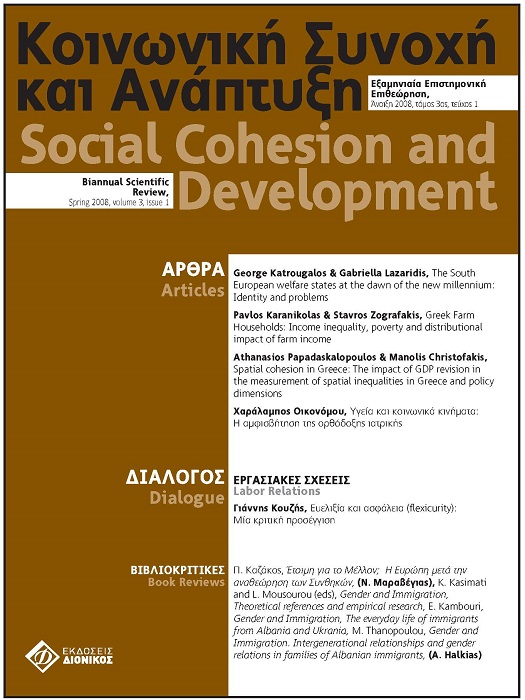Spatial cohesion in Greece: the impact of GDP revision in the measurement of spatial inequalities in Greece and policy dimensions
Abstract
The paper provides a systematic comparative
exploration of the measurement of spatial inequalities
in Greece, at regional and prefectural
level, before and after the last GDP revision.
The aim is to determine the rate and the content
of change in spatial inequalities - towards
either an increase or decline - after the revision,
so as to evaluate the new situation and
set regional policy in its proper dimensions.
The analysis is based on the examination of
GDP data (total and per capita) for the years
2003 and 2001, before and after the revision,
as well as on population derived from the last
Census (2001). The paper uses statistical methods
of regional analysis for the exploration of
spatial inequalities. The main conclusion is
that the spatial disparities have been affected
from the revision in a remarkable degree and
therefore the regional policy must be suitably
adapted in the new conditions.
Article Details
- Zitationsvorschlag
-
Papadaskalopoulos, A., & Christofakis, M. (2016). Spatial cohesion in Greece: the impact of GDP revision in the measurement of spatial inequalities in Greece and policy dimensions. Social Cohesion and Development, 3(1), 45–54. https://doi.org/10.12681/scad.8900
- Ausgabe
- Bd. 3 Nr. 1 (2008)
- Rubrik
- Articles

Dieses Werk steht unter der Lizenz Creative Commons Namensnennung - Nicht-kommerziell - Weitergabe unter gleichen Bedingungen 4.0 International.
Authors who publish with this journal agree to the following terms:
- Authors retain copyright and grant the journal right of first publication with the work simultaneously licensed under a Creative Commons Attribution Non-Commercial License that allows others to share the work with an acknowledgement of the work's authorship and initial publication in this journal.
- Authors are able to enter into separate, additional contractual arrangements for the non-exclusive distribution of the journal's published version of the work (e.g. post it to an institutional repository or publish it in a book), with an acknowledgement of its initial publication in this journal.
- Authors are permitted and encouraged to post their work online (preferably in institutional repositories or on their website) prior to and during the submission process, as it can lead to productive exchanges, as well as earlier and greater citation of published work (See The Effect of Open Access).



